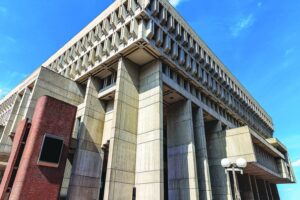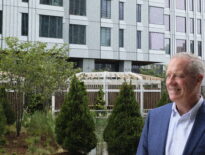Neighborhood business districts and transit hubs across Boston would be positioned for higher-density development and fast-track approvals under a zoning reform package announced today by Mayor Michelle Wu.
And the city is “strongly considering” a time-limited tax break for city-approved housing developments that haven’t yet moved forward with construction.
At a Greater Boston Chamber of Commerce forum, Wu released a report that recommends simplifying and overhauling the city’s 59-year-old zoning code.
To stimulate housing production, it recommends elimination of all minimum parking requirements, expanding as-of-right approvals for residential projects, rezoning squares and transit hubs for higher-density housing and legalization of accessory dwellings up to 1,200 square feet.
“For decades, our system in Boston has been built on a confusing and inconsistent process of handing our exceptions,” Wu said. “Reforming our planning process and zoning code will be a sea change for our city.”
The first major changes will begin this fall with the launch of the “Squares & Streets” planning and rezoning process, focusing on neighborhood business centers and main streets. The process will take as little as six months, Wu said, compared with the three- to five-year timeline for previous neighborhood planning studies.
In an interview with reporters after the mayor’s speech Aimee Chambers, the Boston Planning & Development Agency’s director of planning, said the short timelines Wu promised are being enabled in part by extra staff the agency has hired in recent months and by the much narrower geographic focus this and future rezoning initiatives will take.
In addition, Chambers said, BPDA staff will be developing a menu of options that neighborhood residents can choose from, or which the BPDA can tailor to local conditions.
Starting next year, Chambers said, the city will aim to launch a new planning initiative for a distinct area each month.
Wu made zoning reform one of the pillars of her 2021 mayoral campaign, arguing that Boston’s current system of approving development is unpredictable and prone to manipulation by well-connected developers and land-use attorneys.
The administration hired former Hartford Planning and Zoning Commission Chair Sara Bronin to analyze the Boston zoning code and recommend changes. Bronin is an architect and Cornell University professor who has analyzed thousands of municipal zoning codes
The city can leverage demand for development near transit stations by approving higher-density fast-track zoning, according to recommendations in Bronin’s report. Neighborhoods such as Nubian Square and Sullivan Square would benefit from the creation of new mixed-use zoning districts allowing as-of-right development for a broad range of multifamily and commercial uses.
The report also says Boston should consider a moratorium on new development in neighborhoods vulnerable to coastal flooding.
“Bostonians must come to grips with the fact that much of their city will be underwater in 50 years, including beloved neighborhoods and historic buildings, particularly in the downtown, the flat of Beacon Hill, South End, East Boston, South Boston and the waterfront,” the report states. “The city must get a handle on sea level rise scenarios and must seriously explore a moratorium on new development in those areas which will be flooded at high tide.”
Beyond new limits on development, the city should start to consider a managed retreat from the most vulnerable waterfront areas, Bronin’s report states.
The analysis says Boston’s 3,791-page zoning code is “abnormally long and complex,” running 29 times longer than Massachusetts statewide average, and delays approvals of development.
In her speech, Wu also announced a restructuring of the city’s planning department, creating new expanded zoning reform and zoning compliance teams to spearhead the changes.
While these changes are intended to get more housing proposals approved, Wu also told chamber members that her administration wants to find ways to get already-permitted housing built. The main tool the city is considering, she said, is a “time-limited” tax incentive for approved housing developments. The proposal is still in development, she said, urging Chamber members to share ideas with the administration about it.
“We need city government to be as effective a partner as we can be, in this moment, making sure we build as many homes as possible. I’ve spoken with business leaders, housing developers and academics to understand the tools Boston has to make targeted investments in housing production at a time when new home construction remains incredibly difficult to finance,” she said.
Speaking with reporters after her speech, Wu estimated around 23,000 housing units have been approved for development in the city, but have not yet started construction.
The tax break, as currently envisioned, won’t be available to new proposals taking advantage of the administration’s new office-to-residential conversions program downtown, she said.
A range of factors, including high land and construction costs and collapsing building valuations, have created significant obstacles to new housing development in Boston despite some of the highest rents in the nation and forecasts that those rents will continue to rise.
“Reducing red tape and encouraging housing creation across all price levels is a critical step Boston can take to address the housing crisis. We applaud Mayor Wu for embracing much-needed zoning reforms that will streamline housing approval and for promoting different types of housing creation, such as mixed-use projects and housing closer to public transit. We are ready to partner with the Mayor to ensure that these common sense reforms are implemented as soon as possible,” Greater Boston Real Estate Board CEO Greg Vasil said in a statement afterwards.
Banker & Tradesman staff writer James Sanna contributed to this report.









